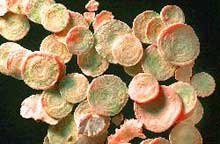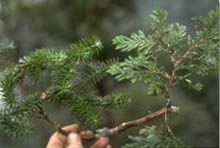Highly promising results from clinical trials indicate that alpha-emitting radioisotopes can kill cancer cells. The Commission’s Joint Research Centre (JRC) and Deutsches Krebsforschungszentrum presented this innovative therapy during a recent workshop in Heidelberg. Alpha-immunotherapy should develop into an effective treatment over the next few years and provide new methods of healing for patients. How does the cancer-killing mechanism work? A cancer-cell selective vehicle, (e.g. a monocolonal anti
Machines not bigger than a molecule will one day surf our blood stream, search and destroy infected tissues, and heal our wounds. This is just one of the applications of nanotechnology. EU Research Commissioner Philippe Busquin will chair an information day on nanotech new frontiers in Grenoble, France, on 14 June 2002. Nanotech research is still in its start-up phase, and will be far more effective if co-ordinated and supported at EU level. The Commission will therefore allocate € 700 million to nan
There is no evidence that MMR or single measles vaccines are associated with autism or inflammatory bowel disease, researchers announced today.
Their conclusion follows the most in-depth analysis of the scientific literature to date, and provides clear reassurance for parents and health professionals regarding the safety of MMR vaccination.
Their findings will be published in Clinical Evidence, the international source of the best available evidence for effective health care, publis
A group of anti-cancer agents that once produced dismal results in clinical trials could once again be a promising tool in fighting the deadly disease, thanks to research by a team of chemists at the University of Washington and in Germany.
The agents, called maytansinoids, were first discovered in the 1970s when scientists looked for tumor inhibitors in a rare Ethiopian plant. The same group of maytansinoids was later isolated from a new bacteria species. The compounds held great promise b

Drilling for oil is expensive – and only too often unsuccessful: in 80 to 90 per cent of all attempts the drill head ends up in worthless sediment rather than hitting the black jackpot as intended. In this way, with every unsuccessful drilling, companies squander several million euros. Yet there is an alternative: the use of tiny fossilised single-celled organisms can reveal to the expert where prospecting for oil is worth while, a dying art at which only a few specialists worldwide still remain prof

An unusual conifer found in a remote area of northern Vietnam has been identified as a genus and species previously unknown to science. The limestone ridges where the tree grows are among the most botanically rich areas in Vietnam, said Daniel Harder, currently director of the University of California at Santa Cruz (UCSC) Arboretum and a co-discoverer of the new species. The discovery is published in the current issue of the journal Novon.
“Biologists don’t need to contemplate finding life